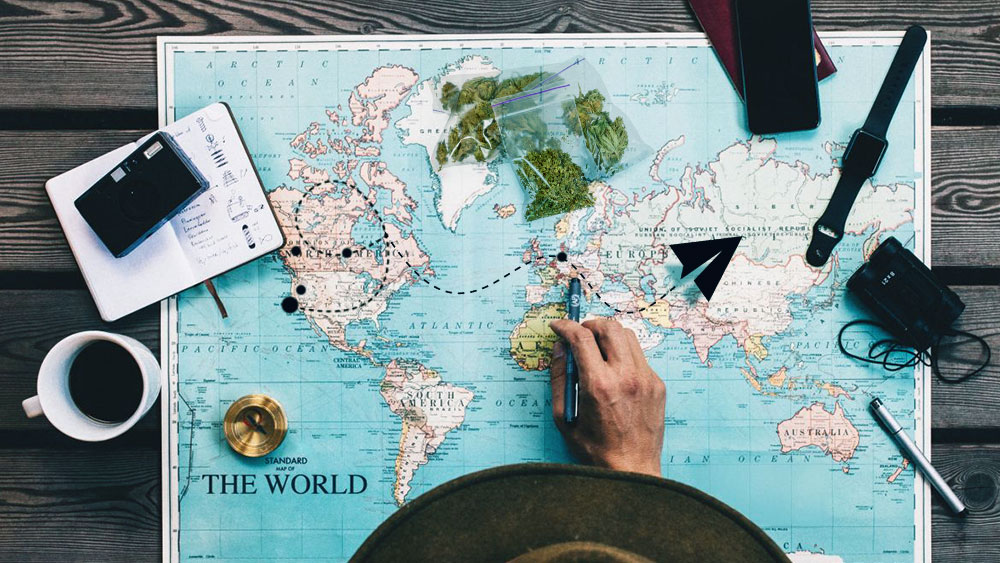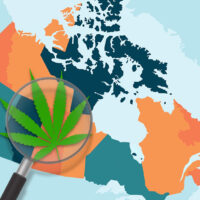Planning to travel abroad? Excited to try new, exotic weed? Pot definitely makes every trip better. However, buying weed in a foreign country can be risky and get you in a lot of trouble.
The so-called cannabis tourism has become the next big thing for weed lovers who want to enjoy their favorite herb in a new place without fearing any legal repercussions.
You may be surprised to hear that only two countries in the world completely legalized weed for recreational use, one of which prohibits foreigners from buying it.
So if you plan to travel, the first thing you should do is check the cannabis laws of your destination country.
You can use this article as your starting point. Here we focus on recreational cannabis use and countries where pot is either legal or decriminalized, with a detailed explanation of the pesky legal terms.
Legal terms
It’s not just you – legal terms are confusing for many people. But when traveling, you should make the effort of understanding your destination country’s weed laws. That can save you from getting fined for cannabis possession, consumption or, god-forbid, incarceration.
Every country has the right to make its own laws to protect its citizens. So when something is legal in one country, that doesn’t translate to legality elsewhere.
For example, the legal age for consuming cannabis or the amount that you’re allowed to buy can differ from country to country.
One of the things that people are usually confused about is the difference between legalization and decriminalization.
Marijuana legalization
Legalization of cannabis essentially means that everything from weed growing, selling and consuming is regulated by laws.
In other words, you can’t be arrested, fined or convicted for consuming or possessing weed if you stay within the legal framework.
That’s why it’s very important to know the legal age for consuming cannabis, the amount allowed for possession, places where consumption is allowed, etc.
Most countries have very strict laws when it comes to trafficking, but you can also get arrested for selling pot if you don’t have an official license.
Marijuana decriminalization
Decriminalization and legalization are very different terms.
Decriminalization, in essence, reflects the gradual change in public opinion on certain topics, such as recreational drugs, same-sex marriage, the right to have an abortion, etc.
Decriminalization actually means that a country repealed (or changed) some of its laws, so people can no longer be subject to prosecution for certain acts.
In the case of cannabis, this usually means that if you get caught with small amounts of weed for personal use, you won’t be prosecuted, you’ll avoid a criminal record and, of course, won’t get any jail time.
But if you get caught with large amounts of pot, you can still get arrested and charged with a criminal offense, so there’s no way around it – you need to be familiar with cannabis laws at all times.
“Illegal but tolerated”
There are countries that haven’t decriminalized/legalized the use of cannabis, but their police often don’t enforce the strict cannabis laws.
For example, Morocco is one of the biggest producers of hash in the world, even though cannabis is officially illegal in that country. Smoking hash is also widely tolerated in Morocco.
Countries with legal weed
Canada
Status: Legal
We waited for this to happen for a long time, and finally, on October 17th, 2018, the big day finally came and cannabis was declared legal for recreational purposes. The lines in front of dispensaries were gargantuan, and for a brief period of time, Canada even ran out of weed to sell.
Although Canada was the second country in the world to completely legalize recreational cannabis, the legalization became breaking news all over the world. Every Canadian province made its own laws on how to distribute and sell cannabis, as well as the minimum age for use. You can check out this related article where I’ve listed the details for each individual province.
All growers need to get a specially approved license issued by the federal government, and each individual with a license is allowed to grow a limited number of plants at home, while the exact number of plants differs from province to province.
So, if you’d like to go to Canada to puff some “authority” weed, acquiring cannabis in this country is now as easy as 123.
Uruguay
Status: Legal, but only for Uruguay citizens.
Personal use of cannabis has been decriminalized since 1974 in Uruguay, and it became a trailblazing country when it became the first in the world to legalize recreational cannabis back in 2013.
It took some time to get all regulations sorted out, and in 2014 it became legal to grow 6 plants at home, to open a growing club/dispensary which had to be registered by the government, and by 2017, 17 specialized “pharmacies” started selling cannabis.
All of this sounds great, but Uruguay is no new Amsterdam, nor is it Canada.
Selling weed to foreigners is actually strictly forbidden. But if someone gave it to you as a present, nothing can stop you from lighting up.
What I found interesting is that Uruguay residents have to be registered, and can get up to 40 grams of weed a month from a registered pharmacy. If they exceed this amount, they will be investigated to determine if they are illegally re-selling cannabis.
Public consumption laws are very similar to tobacco regulations. You can smoke in public, but not around “closed indoor workspaces”. You also can’t smoke inside cafes and restaurants, but it’s allowed if the establishment in question has outdoor tables.
By the way, they say weed is ridiculously cheap here.
The United States of America
Status: It depends
When it comes to the legal status of cannabis in the US, it differs from state to state. Pot is still illegal on the federal level, but numerous states have legalized it for both medicinal and recreational purposes.
At the moment, recreational cannabis is legal in these US states:
| State | The amount allowed for possession | Cultivation |
| Alaska | Up to 28 grams (1 oz) | Up to 12 plants per household with two adults (21+) |
| California | Up to 28 grams (1 oz) | Up to 6 plants |
| Colorado | Up to 28 grams (1 oz) | Up to 6 plants |
| Maine | Up to 71 grams (2.5 oz) | Up to 6 plants |
| Massachusetts | Up to 28 grams (1 oz) + 10 oz at home | Up to 6 plants |
| Michigan | Up to 71 grams (2.5 oz) + 10 oz at home | Up to 12 plants per household |
| Nevada | Up to 6 plants | |
| Oregon | Up to 28 grams (1 oz) | Up to 4 plants |
| Vermont | Up to 28 grams (1 oz) | 6 plants at any given time, as long as only 2 are mature (flowering) |
| Washington | Up to 28 grams (1 oz) | / |
| Washington DC | Up to 56 grams (2 oz) | 6 plants at any given time, as long as only 3 are mature (flowering) |
It’s likely that more US states are going to legalize recreational cannabis in 2019, including: New York, Connecticut, Illinois, Minnesota, New Hampshire, New Jersey, New Mexico, Rhode Island, and Vermont.
Countries that decriminalized cannabis
Here is a list of countries where weed is decriminalized.
| Country | Recreational status | The amount allowed for possession | Cultivation |
| Argentina | Decriminalized | Up to 5 grams | Not allowed |
| Australia | Decriminalized in some states and territories:- Northern Territory- South Australia- Australian Capital Territory | Not allowed, but the possession of smaller amounts results in smaller fines or notices for attending counseling sessions. | Not allowed |
| Austria | Decriminalized | Up to 5 grams | Not allowed |
| Belgium | Decriminalized | Up to 3 grams | Decriminalized for the cultivation of 1 plant |
| Belize | Decriminalized | Up to 10 grams | Not allowed |
| Bermuda | Decriminalized | Up to 7 grams | Not allowed |
| Bolivia | Decriminalized | up to 50 grams | Not allowed |
| Chile | Decriminalized | Up to 10 grams | 6 plants per household |
| Colombia | Decriminalized | Up to 22 grams | Legal up to 20 plants for personal consumption. No limit for medicinal use, if licensed by the “National Anti-narcotics Council” |
| Costa Rica | Decriminalized | Not specified by law. If caught with 1 – 8 g, people will have the cannabis confiscated by the police | Authorization is given to plant cannabis in homes, but only in a non-public manner |
| Czech Republic | Decriminalized | Up to 10 grams | Up to 5 plants |
| Denmark | Decriminalized | Illegal but declared legal in Freetown Christiania | Only for medicinal purposes |
| Ecuador | Decriminalized | Up to 10 grams | Not allowed |
| Estonia | Decriminalized | Up to 7 grams | Not allowed |
| Georgia (Country) | Decriminalized | Possession and consumption, but sale is still illegal | Not allowed |
| Jamaica | Decriminalized | Up to 56 grams (2 oz) | 5 plants |
| Malta | Decriminalized | Up to 3.5 grams | Not allowed |
| Mexico | Decriminalized | De facto legal for personal use (up to 5 grams) | De facto legal for personal use |
| Paraguay | Decriminalized | Up to 10 grams | Not allowed |
| Peru | Decriminalized | Up to 8 grams | Not allowed |
| Portugal | Decriminalized | Up to 25 grams (or 5 grams of hash) | Not allowed |
| Slovenia | Decriminalized | Possession of small quantities result in fines of 42-210 EUR or up to 5 days of jail, or undergoing treatment. | Not allowed |
| South Africa | Decriminalized | Parliament yet to decide | Parliament yet to decide |
| Spain | Illegal for commercial purposes, but decriminalized for personal cultivation and use | Still a legal gray area. People can use cannabis only in private cannabis clubs. | Allowed for personal use, but the plants cannot be seen from the street or other public spaces |
| Switzerland | Decriminalized | Up to 10 grams | Not allowed |
| Ukraine | Decriminalized | Up to 5 grams | Up to 10 plants |
The Netherlands
Status: Illegal, but decriminalized for personal use
What about the Netherlands? Amsterdam is known as the weed capital of the world with its famed coffee shops and millions of tourists pouring from all sides for this unique cannabis experience. It has been considered a “holy place” for cannabis lovers for several decades now.
Well, you’ll be surprised to hear that selling weed in the Netherlands is actually “illegal but tolerated”, just like in Spain.
It’s interesting that almost everyone thinks weed is legal in the Netherlands, when in fact it’s not. But the country is more tolerant of forbidden substances than most other countries, and this especially applies to cannabis.
The Netherlands openly tolerate recreational consumption, possession and even trafficking, although all of this is basically illegal.
I enjoy the logic behind it: a society without “illegal drugs” is simply impossible to achieve, so let’s refocus our efforts on minimizing the damage caused by these substances.
In the Netherlands, cannabis is considered a soft drug, and it’s sold exclusively in coffee shops, which are one of the main tourist attractions, next to the gorgeous architecture and legal prostitution. Although coffee shops are technically illegal, the “tolerance policy” allows them to operate if they follow a couple of rules:
- No advertising
- No hard drugs on the premises
- No sales to persons under the age of 18
- No coffee shops in school vicinity (250 meters radius)
- No sale of quantities larger than 5 grams
- No public disturbances
When it comes to carrying weed in the Netherlands, you are allowed to have up to 5 grams on your person.
However, the neighboring European countries like Germany and Belgium don’t want the influx of cannabis from the Netherlands, so don’t try to smuggle it at the airport or across the border. The police are still allowed to confiscate it, and you may face more serious penalties and financial fines (depending on the quantity).
Because of the tobacco smoking ban, smoking weed inside of coffee shops is allowed as long as you don’t smoke joints with tobacco (spliffs), which are still very common in Europe. However, even this is tolerated in some coffee shops that sell pre-rolled spliffs. So before sparking up, it’s best to check with the staff.
Smoking pot outdoors is considered an offensive act, but it’s usually tolerated. People walking down the street with joints blazing is not an uncommon sight. As long as you don’t make too much noise or bother anyone while you’re smoking, you won’t have any problems.
I’ve been to the Netherlands 4 times so far, followed all of the “unwritten” rules, and had no issues whatsoever. I even asked the cops about smoking and rolling outside, and they said that it’s totally fine.







Happy Zone420 October 26, 2020 at 6:55 am
Where to buy
Happy Zone420 March 4, 2021 at 12:27 pm
Where to buy weed
Happy Zone420 March 7, 2021 at 11:55 am
Hit up [email protected]
Happy Zone420 March 7, 2021 at 11:56 am
He will supply you with high quality buds and others.
Happy Zone420 March 7, 2021 at 11:52 am
Hi